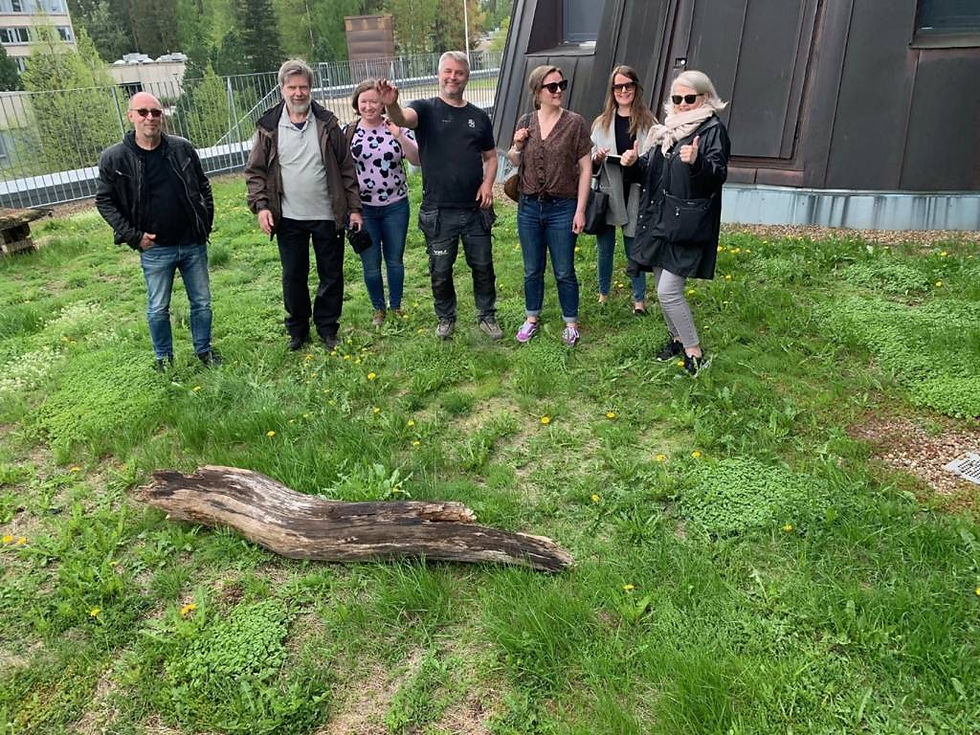Action4Commons consortium meeting recap: Non-human nature stakeholders, commoning, and grammar of institutions
- Laura Albareda
- Dec 18, 2023
- 3 min read
Updated: Apr 30, 2024
On December 11th -12th 2023, the Action4Commons project held the sixth consortium meeting at LUT University in Lappeenranta. The TAU research team visited LUT for two days, and we had great discussions on the project-related problems, literature, research methodologies and theory-building.

First, LUT Business School (LBS) invited the TAU team and their affiliated participants Anna Hannula, Johanna Kujala, and Sybille Sachs to present the working paper “Four types of nonhuman nature stakeholders” to LBS researchers. The paper advanced a matrix of four types of nature-stakeholders extending the stakeholder concept to include a view of non-human agency. This discussion is central to stakeholder theory; although the predominantly Finnish scholarship has advanced the idea of nature as a non-human stakeholder, not everyone agrees. Competing scholarly viewpoints argue that within the theoretical confines of traditional stakeholder theory, nature as a non-human cannot have agency and therefore also cannot be a stakeholder under traditional definitions of a stakeholder. The primary argument advanced in the paper is that nature should be represented by human agency. Anna Hannula and her co-authors convincingly argue and conceptualize why nature can, and perhaps should, be currently considered a stakeholder. This discussion is fundamental to the efforts of the Action4Commons consortium, particularly in our focus on biodiversity. Natural ecosystems play a crucial role and should have a voice in our collective actions, highlighting the relevance of the project to wider environmental and sustainability goals.
Discussing how and why nature should be considered a stakeholder is fundamental to Action4Commons consortium, particularly in our focus on biodiversity.
From the LBS faculty facilities we transitioned to a more informal setting at the Rantasauna, continuing our discussions under a more scenic lake bound setting. Both teams presented their work on the literature review papers and presented early insights from interviews related to the first two work packages. The consensus was that the project is advancing well, and we hoped to discuss the first paper drafts in more detail at the next consortium meeting in May 2024.
Further inspiration struck as our guest speakers joined us online. We first invited Arun Agrawal, Professor of the School of Environment and Sustainability at the University of Michigan, who presented his research on “Commoning.” The commoning concept is a core research concept in the contemporary commons literature, referring to the processes and institutions that create and sustain commons. The resulting discussion focused on understanding the difference between commoning and the processes related to governing commons, as well as how they differentiate. This conversation added depth to our understanding of governing the commons from varied perspectives. In the evening, we enjoyed the sauna at the shore of Lake Saimaa with entertaining music and well-deserved nourishment.
Discussion with Arun Agrawal, Professor at the University of Michigan, about commoning and processes related to governing commons increased our understanding of governing the commons from varied perspectives.
On the second day, new researchers from LBS joined the meeting. First, Doctoral Candidate Natalia Lyly presented her research on mobility transitions in Finnish cities based on the methodology of Grammar of Institutions. Second, Iryna Malacina—post-doctoral researcher and member of the SCI-MAT platform—presented the Exponential Random Graph Model (ERGM) methodology that the LUT team is applying to the study of polycentricity in mining and circularity as part of WP2. Both presentations resonated with the core consortium participants, who engaged them with an array of interesting questions. At noon, Amineh Ghorbani, Associate Professor of the Faculty of Technology, policy and management of Delft University of Technology joined us, introducing her work based on the Grammar of institutions and the role of communities and urban commons.

We closed the day exploring pathways for our theory building in WP3 about Collective Stakeholder Action and had an enjoyable lunch together. These two days were invaluable for building teamwork and proposing new lines of work for all work packages and both core consortium research teams. Great discussion and great landscape on the Saimaa shore. Thank you, Tampere team, for visiting us at Lappeenranta!
Written by Laura Albareda and Jaan-Pauli Kimpimäki




Comments